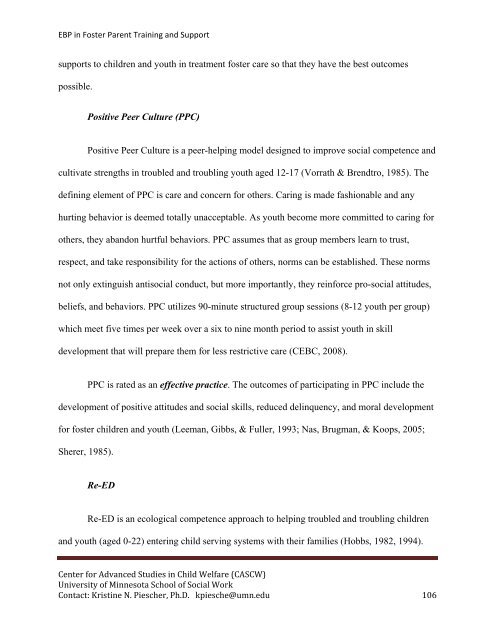Evidence-Based Practice in Foster Parent Training and Support ...
Evidence-Based Practice in Foster Parent Training and Support ...
Evidence-Based Practice in Foster Parent Training and Support ...
You also want an ePaper? Increase the reach of your titles
YUMPU automatically turns print PDFs into web optimized ePapers that Google loves.
EBP <strong>in</strong> <strong>Foster</strong> <strong>Parent</strong> Tra<strong>in</strong><strong>in</strong>g <strong>and</strong> <strong>Support</strong>supports to children <strong>and</strong> youth <strong>in</strong> treatment foster care so that they have the best outcomespossible.Positive Peer Culture (PPC)Positive Peer Culture is a peer-help<strong>in</strong>g model designed to improve social competence <strong>and</strong>cultivate strengths <strong>in</strong> troubled <strong>and</strong> troubl<strong>in</strong>g youth aged 12-17 (Vorrath & Brendtro, 1985). Thedef<strong>in</strong><strong>in</strong>g element of PPC is care <strong>and</strong> concern for others. Car<strong>in</strong>g is made fashionable <strong>and</strong> anyhurt<strong>in</strong>g behavior is deemed totally unacceptable. As youth become more committed to car<strong>in</strong>g forothers, they ab<strong>and</strong>on hurtful behaviors. PPC assumes that as group members learn to trust,respect, <strong>and</strong> take responsibility for the actions of others, norms can be established. These normsnot only ext<strong>in</strong>guish antisocial conduct, but more importantly, they re<strong>in</strong>force pro-social attitudes,beliefs, <strong>and</strong> behaviors. PPC utilizes 90-m<strong>in</strong>ute structured group sessions (8-12 youth per group)which meet five times per week over a six to n<strong>in</strong>e month period to assist youth <strong>in</strong> skilldevelopment that will prepare them for less restrictive care (CEBC, 2008).PPC is rated as an effective practice. The outcomes of participat<strong>in</strong>g <strong>in</strong> PPC <strong>in</strong>clude thedevelopment of positive attitudes <strong>and</strong> social skills, reduced del<strong>in</strong>quency, <strong>and</strong> moral developmentfor foster children <strong>and</strong> youth (Leeman, Gibbs, & Fuller, 1993; Nas, Brugman, & Koops, 2005;Sherer, 1985).Re-EDRe-ED is an ecological competence approach to help<strong>in</strong>g troubled <strong>and</strong> troubl<strong>in</strong>g children<strong>and</strong> youth (aged 0-22) enter<strong>in</strong>g child serv<strong>in</strong>g systems with their families (Hobbs, 1982, 1994).Center for Advanced Studies <strong>in</strong> Child Welfare (CASCW)University of M<strong>in</strong>nesota School of Social WorkContact: Krist<strong>in</strong>e N. Piescher, Ph.D. kpiesche@umn.edu 106
















